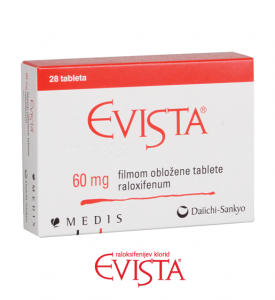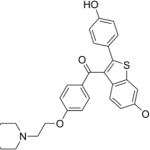Overview and History of Raloxifene
Raloxifene hydrochloride (trade name Evista) is very new anti-estrogenic drug on the prescription market, and it is a member of the category of drugs known as selective estrogen receptor modulators (SERMs), which is actually a sub-category of an even broader category of drugs known as anti-estrogens. The sub-category under anti-estrogens are aromatase inhibitors (AIs), which include the three most common: Aromasin (Exemestane), Arimidex (Anastrozole), and Letrozole (Femara), though there are plenty of other aromatase inhibitors in existence as well. SERMs and AIs are what make up the broad class of anti-estrogens. SERMs and AIs differ quite greatly in terms of their mechanisms of action and how they operate physiologically. As with any profile covering SERMs and AIs, the difference between these two classes of anti-estrogenic drugs must be boldly stated and clarified before moving on to discussing Raloxifene in particular.
It is a common occurrence among the anabolic steroid using and bodybuilding community to confuse the two and assign the wrong (or opposite) properties to either of these anti-estrogens. SERMs act upon the Estrogen receptors in different tissues in the body, and in particular they serve to block the activity of Estrogen at the receptor site in breast tissue (properly referred to as Estrogen antagonism). Effectively, they occupy the Estrogen receptor (whilst simultaneously ‘booting’ out any Estrogen that is occupying those receptors), and they deny any access by Estrogen to those receptor sites. Additionally, SERMs can and do act as Estrogen agonists in other tissues in the body (namely, in the liver). As an Estrogen agonist, the drug will serve to do the opposite of the previously described action, and instead it will bind to the receptor and initiate estrogenic effects in those tissues. As a result, SERMs serve to only antagonize (or agonize) the effects of Estrogen in certain tissues – they will not reduce total circulating blood plasma levels of Estrogen in the body, and therefore some estrogenic side effects cannot be remedied by SERMs, such as water retention and bloating.
On the other hand, aromatase inhibitors disable the root cause of Estrogen production in the body by binding to the enzyme responsible for converting (aromatizing) androgens into Estrogen: the aromatase enzyme. Once inhibited and disabled, the aromatase enzyme cannot act to produce any Estrogen in the body, and thus total circulating blood plasma levels of Estrogen in the body are effectively reduced. Aromatase inhibitors can and do eliminate the estrogenic side effects that SERMs cannot possibly remedy, such as bloating and water retention.
Specifically, Raloxifene is a non-steroidal SERM belonging to the benzothiophene family. Raloxifene is very similar in its mode of action as Nolvadex (Tamoxifen), and does exhibit both Estrogen agonist as well as Estrogen antagonist effects in different tissues throughout the body. In particular, Raloxifene serves as an Estrogen antagonist in breast tissue and uterine tissue while at the same time acting as an Estrogen agonist in bone tissue. Raloxifene is in fact utilized in medicine in the prevention of osteoporosis in post-menopausal females due to its estrogenic activity in bone. In contrast, Nolvadex is known to act as an Estrogen antagonist in bone, which obviously presents a problem for female breast cancer patients who have been prescribed the use of Nolvadex. Considering these properties, it is therefore understandable why Raloxifene had demonstrated some clear advantages over Nolvadex, and has proven itself as a novel new drug in the treatment of various post-menopausal diseases in female patients.
 Eli Lilly and Company developed Raloxifene, and Raloxifene (under the trade name Evista) entered the prescription market in 1997 when it was approved by the FDA. Its initial use was in the treatment of osteoporosis (due to its estrogenic effects in bone tissue, increasing bone density in patients). 10 years later in 2007, Raloxifene’s approved uses were broadened to include breast cancer treatment. It has since become a very popular drug, used in over 50 countries worldwide.
Eli Lilly and Company developed Raloxifene, and Raloxifene (under the trade name Evista) entered the prescription market in 1997 when it was approved by the FDA. Its initial use was in the treatment of osteoporosis (due to its estrogenic effects in bone tissue, increasing bone density in patients). 10 years later in 2007, Raloxifene’s approved uses were broadened to include breast cancer treatment. It has since become a very popular drug, used in over 50 countries worldwide.
Because of Raloxifene’s greater differences in its selectivity of Estrogen agonism and antagonism in different tissues in the body, there is ongoing investigation of its application in other diseases, including prostate cancer, acromegaly, uterine cancer, cardiovascular disease, and breast cancer[1].
Bodybuilders and anabolic steroid users are attracted to the use of Raloxifene due to its nature as an anti-estrogen in the fight against Estrogen-related side effects that are usually caused by the use of aromatizable androgens that result in high blood plasma levels of Estrogen in the body. A common estrogenic side effect as a result of this is the development of gynecomastia. In the realm of gynecomastia in particular, Raloxifene has actually demonstrated more promising effectiveness than Nolvadex (Tamoxifen)[2].
As is common with all SERMs and anti-estrogens, Raloxifene has also demonstrated considerable benefit in stimulating endogenous natural Testosterone production in males, as studies have demonstrated an increase of serum Testosterone levels by 20% from 120mg of Raloxifene per day[3].
Chemical Characteristics of Raloxifene
Raloxifene (Evista) is a non-steroidal selective Estrogen receptor modulator (SERM) that possesses both mixed agonistic as well as antagonistic properties in relation to Estrogen in different areas of the body. Raloxifene belongs to a family of compounds known as benzothiophene compounds. Other SERMs such as Clomid (Clomiphene Citrate) and Nolvadex are also SERMs, but instead belong to the family of triphenylethylene compounds. Although Raloxifene is not a member of the same family of compounds, it is indeed a very closely related compound to Nolvadex and Clomid.
Properties of Raloxifene
As previously established, Raloxifene is a SERM and although it is an anti-estrogen, it will not reduce total blood plasma levels of Estrogen in the body. It instead serves to block the effects of Estrogen at the Estrogen receptor in certain tissues in the body (breast tissue), while acting to promote estrogenic effects in other tissues (bone and uterine tissue). It is therefore effective in the prevention and/or treatment of gynecomastia.
Raloxifene also serves to act as an Estrogen antagonist at the hypothalamus, stimulating gonadotropin production (LH and FSH) from the pituitary gland, which ultimately results in an increase in endogenous Testosterone levels.
 Raloxifene Hydrochloride (AKA Evista)
Raloxifene Hydrochloride (AKA Evista)
Chemical Name: [6-hydroxy-2-(4-hydroxyphenyl)- benzothiophen-3-yl]- [4-[2-(1-piperidyl)ethoxy]phenyl] -methanone
Molecular Weight: 473.584 g/mol or
Formula: C28H27NO4S
Original Manufacturer: Eli Lilly and Co.
Half Life: 27.7 hours
Detection Time: Currently unknown
Anabolic Rating: N/A
Androgenic Rating: N/A
Raloxifene References:
[1] “FDA Approves New Uses for Evista” (Press release). U.S. Food and Drug Administration. 2007-09-14. Retrieved 2007-09-15.
[2] Beneficial effects of raloxifene and tamoxifen in the treatment of pubertal gynecomastia. Lawrence SE, Faught et al. J. Pediatr. 2004 Jul;145(1 ):71-6.
[3] Effects of raloxifene on gonadotropins, sex hormones, bone turnover and lipids in healthy elderly men. Eur J Endocrinol. 2004 Apr;150(4):539-46




